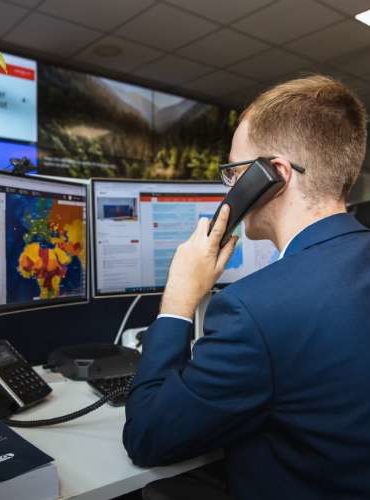Security in Dubai, UAE and COP28 Climate Change Summit
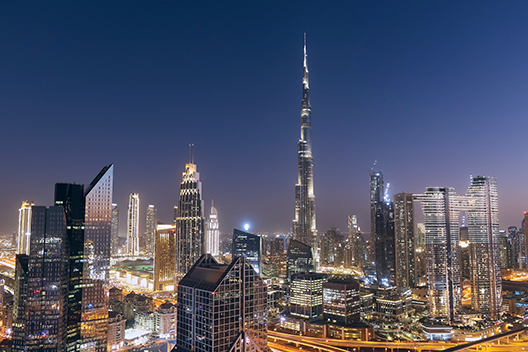
The United Nations Climate Change Summit, COP28 will be hosted in Dubai at the end of the month to bring together global leaders in an effort to take action against climate change.
The Middle East, with its vast energy resources, intricate alliances, and ongoing conflicts, plays a crucial role in the global energy landscape, and the consequences of regional conflicts and geopolitical dynamics in the area have far-reaching implications for the world’s environmental and sustainability goals.
However, in addition to the long-standing geopolitical tensions and conflicts, the Israel-Hamas war holds the potential to heighten tensions and detract from the success of this summit, with the likely possibility of an increasing security risk to Westerners travelling to Dubai.
In this article:
- Security factors during COP28 in Dubai
- Background on Houthi Movement in Yemen
- UAE’s involvement in the Yemen conflict
- Potential for further destabilisation triggered by the Israel-Hamas War?
- Potential outcomes for security in Dubai and UAE
Security factors during COP28 in Dubai
Many Israeli climate organisations have stated that they will boycott COP28 and it is highly likely that Israel will be forced to withdraw from COP28 entirely due to security concerns.
However, COP28 will still attract thousands of Westerners, including many world leaders, diplomats and influential businesspeople. It is likely that COP28 represents an attractive target for terrorist actors due to the influx of foreigners and the international publicity of the event.
On 29 October, the UK’s Foreign, Commonwealth & Development Office (FCDO) issued a warning for British tourists visiting the United Arab Emirates (UAE), indicating an increased threat of terrorist attacks. The advisory warns of a very likely risk of terrorist attacks, which could be indiscriminate and may target places frequented by foreigners. While terror attacks within the UAE and rare and the Emirati counter-terrorist forces are heavily financed and well-trained, there is a realistic possibility that forces will be overstretched as a result of COP28 and that self-radicalisation within the region will increase as a result of the situation in the Gaza Strip.
Background on Houthi Movement in Yemen
In 2004, the Iranian-backed Houthi Movement, otherwise known as Ansar Allah (Supporters of God), rebelled against the Yemeni government with the aspiration of taking control over the entirety of Yemen. The conflict escalated in 2014 when Houthi forces seized Yemen’s capital, Sanna, and forced the Yemeni government into exile. This led to the deployment of a Saudi-led coalition in 2015 that seeks to establish full territorial control by the internationally recognised government within Yemen.
The Saudi-led coalition consists of predominantly Sunni and Arab nations such as the UAE, and is backed by Western powers including the USA, UK and France.
UAE’s involvement in the Yemen conflict
The UAE’s involvement in the coalition has involved a range of military and logistical support for the government of Yemen, including air strikes, the deployment of troops to Yemen and training local Yemeni militias allied to government forces.
The UAE’s involvement in the conflict has made it a target for Houthi forces who have developed an arsenal of long-range drones and missiles facilitated by Iran. Houthi forces have conducted numerous drone and missile attacks on the UAE, typically targeting strategic locations in Abu Dhabi and Dubai, such as airports, ports and oil facilities.
Since 2019, the UAE has significantly reduced its military footprint in Yemen, however it still projects power through its support of a number of militias allied to Yemeni government forces. The Houthis have conducted attacks on the UAE in response to successful military operations by pro-government militias supported by Abu Dhabi, which resulted in a series of high-profile attacks in 2022 against high-profile targets in Abu Dhabi and Dubai.
While the UAE maintains a sophisticated air-defence capability and has been able to shoot down the majority of projectiles within its airspace, it is likely that the Houthis have sufficient drones and missiles to overwhelm and penetrate UAE air defence.
The Houthi Movement have currently been in talks with Saudi Arabia and other local actors regarding a ceasefire.
Potential for further destabilisation triggered by the Israel-Hamas War?
There is a realistic possibility that the Israel-Hamas war destabilises the Middle East, and Iran exploits the situation to order its proxy forces to attack Israeli, Western and anti-Iranian forces and interests throughout the region.
Houthi forces have attempted drone and missile attacks on Israel in response to the Israel Defence Forces (IDF) military activity in the Gaza Strip, with all attacks to date intercepted by IDF or US air defence.
There is a realistic possibility that both Saudi and the UAE will be forced to respond to Houthi attacks which will invariably provoke retaliatory attacks from the Houthis. Moreover, there is also a realistic possibility that the Houthi rebels might seek to exploit the current situation in the Middle East to conduct attacks on the UAE.
In the event of a wider conflict involving Israel, the Houthi rebels could exploit regional tensions to launch missile and drone attacks, engage in cyber warfare, and employ asymmetric tactics against the UAE, aiming to distract or pressure the UAE due to its involvement in regional security initiatives and the Saudi-led coalition.
A further motivation for the Houthis, who are backed by Iran and reportedly allied to Hezbollah, would be to present themselves as defenders of the Palestinian cause and target the UAE for its recent normalisation of relations with Israel and ties to the West.
Potential outcomes for security in Dubai and UAE
If the Israel-Hamas conflict is not contained and provokes a US retaliation, the Supreme Leader of the Houthi Movement has issued a statement declaring that they will respond with drones and missiles, and with the Al Dhafra Air Base located just to the south of Abu Dhabi, it is highly likely that Houthi forces will attempt to target the US military and US interests within the UAE.
For those travelling on business to UAE or will be attending COP28, Solace Global Risk facilitate safer travel for corporate travellers, executives and private clients, with travel risk assessments and end-to-end secure journey management.
Security solutions include intelligence and advisory, latest security alerts through Solace Secure, security trained drivers and airport meet and greet.
Our Journey Risk Management Solutions
Speak to our team about your journey management needs
Israel’s Military Strategy and Biden’s Visit
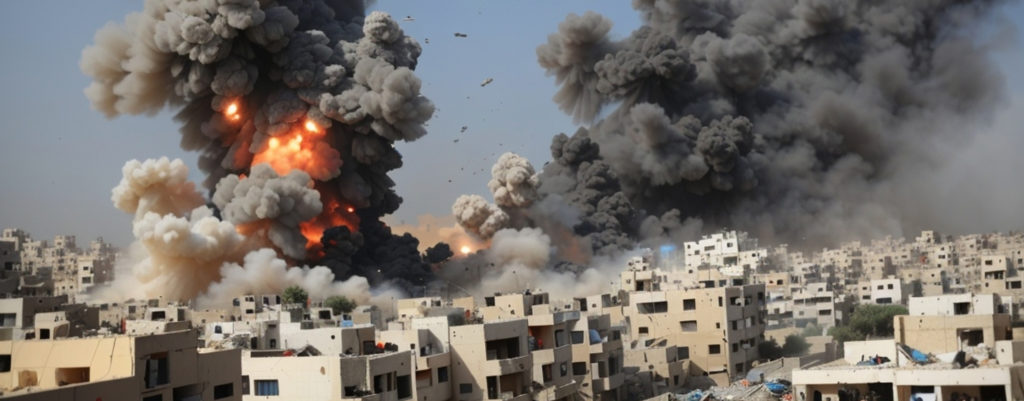
Current Assessment of Israel Hamas Conflict
Intelligence cut-off time 11:00 GMT 17th of October 2023
Whilst it remains almost certain that the Israeli Defence Forces (IDF) will commit to a ground offensive in the Gaza Strip, this is unlikely to occur within the next 24-48 hours.
The main factor contributing to the postponement is the recent revelation of President Biden’s visit to Israel for discussions with Israeli Prime Minister Benjamin Netanyahu on Wednesday 18 October. It is highly unlikely that the US will sponsor an IDF invasion while President Biden is within Israel due to the threat associated with Hezbollah retaliation from Lebanon, which will almost certainly be backed by the Iranian regime, or from one of the other militant groups operating out of the West Bank. It is estimated that Hezbollah alone has amassed a stock of over 150,000 rockets. While most of these rockets are crude and unguided munitions that range out only to 10-40km, Hezbollah also maintain a stock of more sophisticated Iranian-derived rocket and missile systems such as the Fateh-110 (250-300km), SCUD-B/C/D (300-550km) and the Zelzal 1/2 ballistic missiles (125-250km). Such weapon systems enable Hezbollah to target high-value targets such as Ben Gurion airport with a high degree of accuracy. While it is expected that Israel’s Iron Dome air defence system will detect and intercept the majority of rockets, there is a realistic possibility that Hezbollah could launch missile and rocket salvos large enough to overwhelm the air defence system.
Given the missile and rocket threat posed by Hezbollah and the fact Hamas have now likely fired the majority of their rockets, there is a realistic possibility that the IDF will be forced to reposition mobile elements of its Iron Dome system to counter the emerging threat in the north.
Iran’s Involvement with Israel Hamas Conflict
Iran has warned that its proxy forces will conduct “pre-emptive action” in response to Israel’s retaliatory strikes on Gaza, which will invariably include the use of Hezbollah forces. However, it is unlikely that Hezbollah will conduct any major attacks with President Biden in Israel for fear of a major US retaliation.
Moreover, it is more likely that Hezbollah and Iran will wait until Israel commits forces to Gaza as the IDF will have a considerable amount of its forces fixed in the south, offering a tactically advantageous position to open up a northern front that will almost certainly stretch IDF forces and complicate Israeli re-supply and sustainment. To counter Iran and its proxies’ threats, the US has moved its USS Gerald Ford led Carrier Strike Group (CSG) 12 into the Eastern Mediterranean and has deployed a second CSG led by the USS Eisenhower to the Mediterranean which is currently in the eastern Atlantic and is expected to enter the eastern Mediterranean in the next couple of days. The combined combat power of two US CSGs will provide Israel with overwhelming air superiority should the US enter into a conflict with Israel, with warnings already issued to Iran that the US will engage Iranian proxy forces. It is highly likely that Israel will delay a ground offensive until the USS Eisenhower is positioned in the eastern Mediterranean.
Expectations for Biden’s Visit to Israel
It is expected that Biden will discuss with Netanyahu the evacuation of civilians from the Gaza Strip through the Rafah crossing with Egypt. It is likely that Biden will demand that a humanitarian corridor is established before IDF forces enter Gaza, with Biden also forecasted to visit Egypt where he will likely use diplomatic pressure to demand the same from Egypt. It is likely that the IDF will want to commit forces sooner rather than later as any delay will afford Hamas and other militants to prepare defensive positions and mobilise forces. However, Israel is hugely dependent on US military aid which currently stands at approximately USD 4 billion per annum. It is unlikely that Israel has weapon stocks high enough to sustain military operations whilst maintaining enough weaponry to counter Hezbollah or deal with a wider conflict. Therefore, it is likely that Israel will have to submit to US requests in order to guarantee the delivery of future military aid and will not commit to a ground offensive until Biden has some reassurances from Tel Aviv.
Alternative Analysis
Hezbollah, under orders from Iran will launch a pre-emptive attack on Israel prior to the arrival of President Biden. Such a move will provoke Israel into retaliating and committing to a ground offensive in Gaza before the Rafah crossing is opened and civilians are evacuated, causing an acute humanitarian crisis. This will undoubtedly provoke much international condemnation, resulting in anti-Israeli protests and rhetoric and potentially force the West to temper its support of Israel.
Solace Global Security Within Israel
Whether you are considering an evacuation or seeking to continue operations while ensuring the safety of your team, we are here to assist.
For those seeking a secure exit from Israel, Solace Global offers comprehensive journey management services:
- Private Charter Flights: Flight options are available to various destinations across Europe.
- Secure Ground Transportation: Secure movement within Israel, ensuring access to open land borders and maritime evacuation points.
- Armed or unarmed English-speaking security-trained drivers, Close Protection Officers (CPOs), and discreet, low-profile vehicles at your disposal.
Military Coup in Gabon August 2023
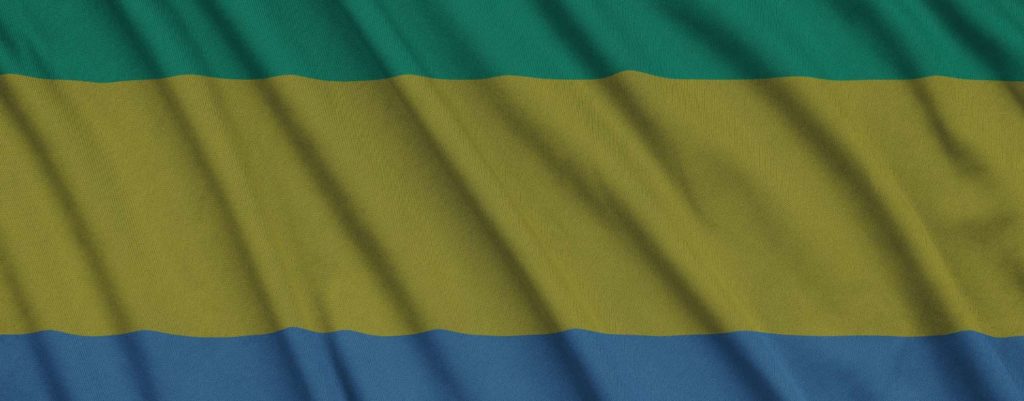
Summary of Military Coup in Gabon
In the early hours of 30 August, the Gabonese Election Centre (CGE) announced that President Ali Bongo had won a third term in office, having received 64.27 percent vote share in Saturday’s general election. However, just after 05:00 local time, a group of senior officers from the Gabonese military announced on television channel, Gabon 24, that they had seized power with the full support of the Gabonese security and defence forces.
Introducing themselves as members of The Committee of Transition and the Restoration of Institutions, the officials stated that the election results were cancelled, all borders were closed until further notice and state institutions – the government, the senate, the national assembly, the constitutional court and the election body – were dissolved.
Following the announcement, domestic and regional sources reported gunfire could be heard in the capital Libreville. However, as the day progressed, the streets appeared calm, and crowds of citizens peacefully took to the streets. Videos circulating on social media showed multiple instances of people celebrating and cheering, often in close proximity to the country’s armed forces. So far, there has been no signs of widespread protest or alarm. Several hours after the officers’ announcement, internet access also appeared to be restored for the first time since Saturday’s vote.
The Gabonese government has yet to make an official statement, with President Bongo reportedly under house arrest, surrounded by his family and doctors.
Potential for Political Unrest in Gabon
Ahead of the coup, there was significant concern over potential unrest following Saturday’s presidential, parliamentary and legislative elections that the opposition alleged were plagued by fraud. Questions over the election’s transparency were re-enforced by the lack of international observers, the suspension of foreign media broadcasts, the decision to cut internet service, and the imposing of a nationwide curfew.
President Ali Bongo and his father, Omar Bongo, have ruled Gabon since 1967, but frustrations with the political dynasty had been growing for several years ahead of Saturday’s election. The Central African nation is a major oil producer, so much so that it is a member of OPEC, as well as being a major exporter of uranium and magnesium. Indeed, the country is home to over one-quarter of the world’s proven magnesium reserves. However, Bongo has done little to channel its oil and other wealth towards the population of some 2.3 million people, a third of whom live in poverty.
This is also not the first attempt in recent history to overthrow Bongo as in January 2019 he and the Gabonese government were able to foil an attempted military coup after soldiers briefly seized the state radio station and broadcasted a message saying Bongo, who had suffered a stroke months earlier, was no longer fit for office.
Find further analysis on political instability in West Africa
Situation Analysis by Solace Global
The strength of Gabon’s extractive-based economy means that it is Africa’s third most wealthy country by GDP per capita. However, with large swathes of the country still living in poverty, it is highly likely that the state has failed to transfer much of this wealth to ordinary citizens. It is likely that economic disparities have been one of the major triggers for the coup. This is likely supported by the lack of public resistance and the fact that celebrations have been seen on the streets of Libreville and other major population centres across the country.
Furthermore, the coup has yet to be characterised by anti-French rhetoric in a similar vein to the recent West and Central African coups in countries like Niger and Mali. However, the coup is almost certainly another problem for Paris in Africa, with multiple French companies operating in the country. Unlike the other coups in Africa, it is doubtful that the Gabonese coup leaders will seek Russian support in favour of maintaining Western relations. Gabon has traditionally had weak ties with Russia and unlike much of Africa, has not been threatened with major insurgencies and security issues. Moreover, Gabon was one of the countries in Africa that voted against Russia at the United Nations in the 2022 resolution on Ukraine.
Economically, the coup is almost certainly going to lead to price volatility in global oil and magnesium markets. Gabon has strong economic links with both France, and increasingly with China, and it is a major exporter of commodities to these nations. Reports indicate that some foreign companies like the French mining company, Eramet, have already suspended operations in Gabon in response to the coup. It is therefore highly likely that both France and China will be looking for the political situation to be resolved quickly, and there is a realistic possibility of diplomatic involvement from both Paris and Beijing.
In the immediate future, it is unlikely that any major protests or armed clashes will break out as the Gabonese security forces are seemingly onside, and most indications suggest the public is too. The turning on of the internet was likely a move to win over the public as well as signal a different approach to governance than the Bongo regime. However, this also presents an increased potential for demonstrations and protests, both in favour and against the coup, to occur as information is spread on social media. There is a realistic possibility of sustained demonstrations which will likely lead to disruption in major population hubs. Borders will likely remain closed for upcoming days, but if scenes remain calm, borders are likely to reopen quicker than seen in Niger and Mali.
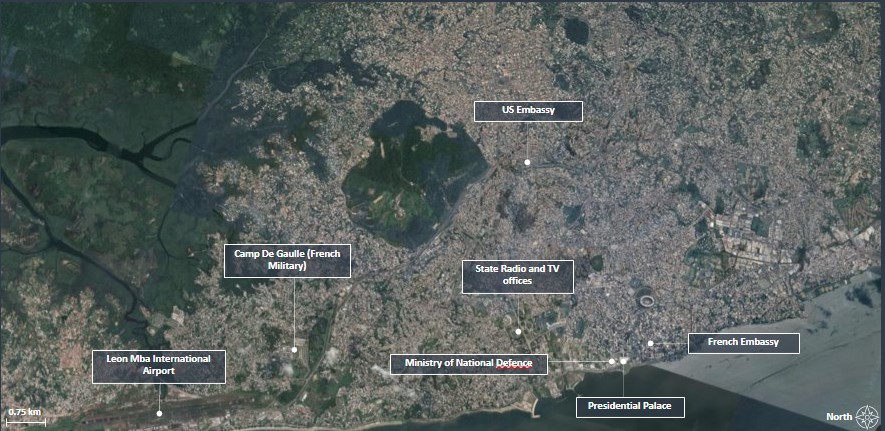
Advice for travellers affected in Gabon
- Although the coup appears to be relatively peaceful, widespread unrest and violence could ignite at any time. Travellers should avoid all ongoing military activity and any large public gatherings as the security situation may deteriorate quickly and without warning.
- In the event of significant security development, travellers in Gabon should follow any instructions issued by the government or military authorities. If a curfew is declared it is vital to abide by the curfew rules to avoid any conflicts with security forces.
- If violence escalates inside the capital, consider departing from Libreville whilst commercial options are still available.
- Key military and political infrastructure inside the capital are very likely to remain focal points for violence and demonstrations. You should be particularly vigilant in these areas and follow any specific advice from the local security authorities.
- Expect significant travel disruption and an enhanced security force posture inside Libreville in the short-term. Should any opposition movement to the coup materialise, it is likely that flights will be suspended, and roadblocks or vehicle checkpoints will be established.
- Always follow all instructions and orders from security forces. Where possible, avoid areas of active conflict and remain inside a secure location away from windows.
- Ensure that you always carry personal identification documents. Consider making photocopies of important documents in case of confiscation, theft or loss and keep these documents separated from the originals.
- Emergency services may be unable to support you in the short-term. Be aware of what consular support may be available to you in-country. Many countries do not provide direct consular support in Gabon. The UK’s consular services for Gabon are based in Yaoundé, Cameroon.
- Have emergency contact numbers saved on your phone. These should include the local authorities, medical facilities and any consular support. Ensure that mobile phones are charged in case of any losses in electricity.
- If caught in the vicinity of a security incident, seek shelter immediately and leave the area if safe to do so. Continue to adhere to all instructions issued by authorities and obey any security cordons in place.
- Monitor the Solace Secure platform and trusted local media for updates relevant to the coup.

Attempted coup in Niger July 2023
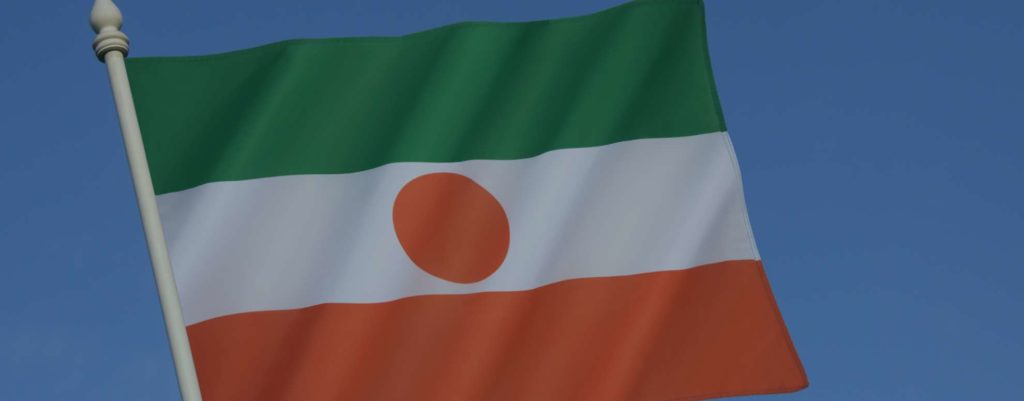
Summary of Attempted Coup in Niger
On the morning of 26 July, multiple domestic and regional sources reported that a potential coup was underway in Niamey, Niger. Early indications suggested that the Presidential Guard had blocked the entrance to the Presidential Palace, and detained President Mohamed Bazoum. Concurrently, government ministries next to the palace were blockaded, with those inside, including the Minister of the Interior, detained.
By early afternoon, the Niger Armed Forces (FAN) and National Guard had both deployed in the vicinity of the Presidential Palace. The FAN and the Presidential office both released statements asserting that the ongoing coup attempt was being driven by “anti-republican” elements and gave the Presidential Guard an “ultimatum” to stand down and release President Bazoum, or face being attacked. Unverified social media reports have subsequently described armoured FAN columns entering Niamey. Further unverified reports later emerged of roadblocks appearing across the city.
The conditions in Niamey remained calm initially, however, as the situation developed businesses were reputedly told to close and residents were ordered to stay at home. Operations at Diori Hamani International Airport currently remain unaffected, with flight tracking data showing that both inbound and outbound flights were operating as normal.
Recent Instability in Western Africa
Since 2020, several coups have taken place across the Sahel region, most notably in neighbouring Mali and Burkina Faso. The key driver for instability has been the inability of central governments to guarantee internal security from a myriad of insurgencies and terrorist actors. Niger has been increasingly afflicted by the instability affecting the wider region. In the southeast, Niger is battling incursions from Boko Haram and in the west of the country, the government is attempting to contain threats from Islamic State’s Sahel Province.
Due to the external and internal threats posed by these actors, Niger has become a major operating base for Western nations in the region. Indeed, both France and the USA utilise the country as a base for operations in the wider Sahel.
This relationship has grown in significance for Western governments as relations with other states in the region, such as Mali and Burkina Faso, have broken down in the wake of their own respective coups, leading to the expulsion of French forces.
Further strengthening this relationship is the fact that Niger’s President was democratically elected in 2021 and is one of the region’s few remaining democratically elected heads of state. However, in February 2023 protests erupted in the capital, Niamey, with demonstrators expressing their dissatisfaction with a sustained French military presence in the country, with many believing that the foreign presence was either ineffective or had exacerbated security concerns.
Find further analysis on political instability in West Africa
Situation Analysis by Solace Global
At the time of writing, there has been no official statement from Presidential Guard. However, given the recent regional trends, it is highly likely that this attempted coup has transpired due to concerns regarding the deteriorating security of Niger.
This is further evidenced by the fact that the Presidential Guard has also apprehended the Minister of the Interior, who is the person ultimately responsible for policing and internal security in Niger. The recent uptick in attacks near the borders with Burkina Faso and Mali likely provided the catalyst for the current situation.
As the situation develops, it is almost certain that key transport routes and critical locations across Niamey will be seized by rival forces. This will include Niamey’s key river crossings, which connect the main part of the city on the eastern bank of the Niger River to its western parts, the international airport, and state TV and radio offices. At the time of writing, it is believed that President Mohamed Bazoum remains in detention.
The success of the ongoing attempted coup remains to be seen. Initial signs suggest that the FAN and National Guard have remained loyal to President Bazoum and are willing to fight. If this remains the case, it is unlikely that the coup succeeds due to the disparity in military firepower between the two sides. This result would ultimately see the Presidential Guard purged.
However, should the coup succeed, civil unrest, both in favour and against, will highly likely occur. A transitional military council will likely take over the government and immediately revise the stationing of foreign militaries in Niger. The removal of the last remaining Western forces in the region will likely create a security vacuum, that will almost certainly benefit the insurgencies and terrorist groups in Niger and the wider region.
Stay ahead of global events with free weekly intelligence

Alert Plus: Multiple Large Earthquakes Strike Southern Turkey

Situation Summary: Large Earthquakes in Southern Turkey
At 01:17 (UTC) on 6 February, a magnitude 7.8 earthquake was detected 30km west-northwest of Gaziantep, Turkey (37°10’26.4″N 37°01’55.2″E). The earthquake struck at a depth of 24.1km and it quickly became apparent that a significant amount of casualties and damage had occurred in Turkey and northern Syria. There have been several substantial aftershocks, eight of which recorded a magnitude of at least 5. Tremors have also been felt in Greece, Cyprus and Lebanon.
As of 10:00, at least 1200 fatalities had been confirmed across Turkey and Syria. Images and videos posted to social media and local news outlets indicate considerable damage to infrastructure. In Turkey alone, at least 2818 buildings have collapsed. At 10:24, the region was then struck again by a separate 7.5 magnitude earthquake 4km south-southeast of Ekinozu (37°10’26.4″N 37°01’55.2″E) – roughly 128km north of the earlier epicentre. At the time of writing, it has been reported that the region has experienced at least 100 aftershocks.
According to the United States Geological Survey (USGS), the area in which the quakes have hit is populated predominately by non-earthquake-resistant residential structures. They are often made of masonry, brick, and non-reinforced concrete frames. As a result, many buildings will have been badly damaged or will have collapsed completely. This means that there will be few places in which survivors can shelter safely.
Turkey declared a ‘Level 4 Alarm’ after the initial tremor, which reportedly includes a call for international assistance and support. The European Union has agreed to send rescue teams and is preparing further help for Turkey. US officials are also monitoring the situation and have noted their willingness to help. Rescue teams from India, Russia and Taiwan have also deployed.
President Recep Tayyip Erdogan has described events so far as the nation’s worst disaster since the 1939 Erzincan earthquake, a 7.8 magnitude earthquake that killed over 32,000.
Intelligence Analysis by Solace Global
The earthquakes have struck as Turkey prepares for its May elections, which were already seen as some of the country’s most consequential in decades. These earthquakes further add electoral weight, since previous large earthquakes have led to major political changes in the country. In the wake of Turkey’s last major earthquakes, in 1999, voters turned away the incumbent parties in the 2002 elections. These parties were punished as a result of the poor relief and reconstruction efforts, and for the large-scale corruption the earthquake exposed. Recep Tayyip Erdogan and his newly formed Justice and Development Party (AKP) party were the major beneficiaries of this political shift. As a result, he became Prime Minster in 2003 and ascended to the Presidency in 2014, a post he currently still holds.
The province of Gaziantep, where the epicentre of the earlier earthquake is located, has long been a cradle of support for the AKP and Erdogan. Indeed, support for the AKP and Erdogan has remained high in the province despite the recent economic volatility and uncertainty in the country, and the persistent accusations of corruption levied against the AKP and President Erdogan. Consequently, comprehensive aid and reconstruction efforts are likely to be implemented swiftly. Despite this, contemporary Turkish political history suggests that the AKP, having been the beneficiaries of the 1999 earthquake, may be victims of these ones. This becomes increasingly possible if victims feel that aid is too slow, not sufficient, or that reconstruction efforts are corrupt.
Northern Syria has also been badly affected by the disaster. This part of the country has seen several recent Turkish military incursions; it is also home to some of the last anti-government areas of control. The tremors are almost certain to mean that Turkish offensive military operations in the region are temporarily halted, as the military is redeployed to support disaster relief and search and rescue operations in Turkey. The Syrian government may also seek to fast-track search and rescue and reconstruction efforts in areas in the region it controls in a bid to try and win support across an area which was long a stronghold of anti-Assad movements.
Those with interests in the region are advised to note that there remains considerable potential for large-magnitude aftershocks or follow-on tremors.
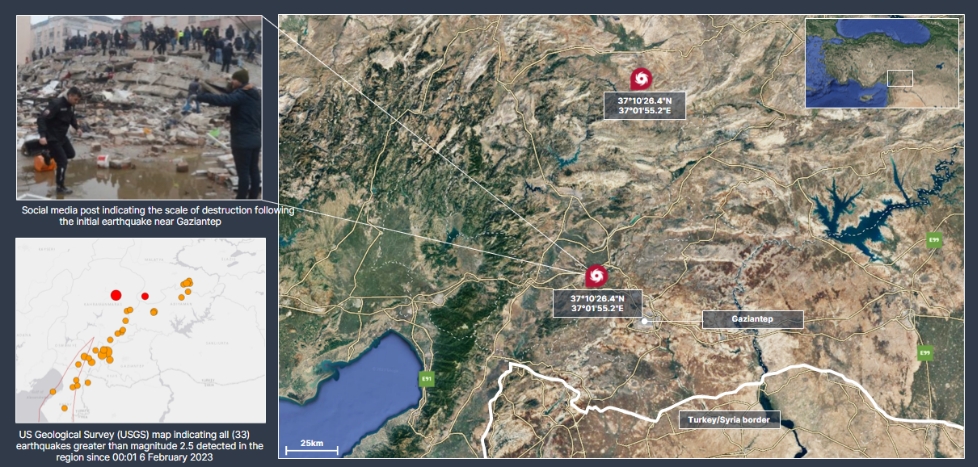
Advice if Affected by Earthquakes in Turkey
- Individuals with planned travel to Turkey or Syria are advised to reconfirm itineraries and expect considerable localised travel disruption, particularly in the vicinity of the Turkey/Syria international border
- Be aware that flights into and out of regional airports may be disrupted, impacting downstream travel plans
- Travellers are advised to avoid the immediate vicinity of all damaged infrastructure and ongoing emergency services operations
- Be aware that large aftershocks or additional earthquakes have a realistic possibility of occurring in the coming hours
- If caught in an earthquake, it is advisable to ‘Drop, Cover, and Hold On’ to reduce the risk of injuries, ensuring to cover the head and neck
- Following an earthquake, there can be serious hazards, such as damaged buildings, leaking gas and water pipes, and downed power lines
- If caught outside during earthquakes, exit vehicles and remain clear of overhead powerlines, bridges, or large structures
- If earthquakes occur during travel within coastal regions, be alert to the possibility of tsunami and consider heading towards high-ground once the initial tremors have passed
- Anticipate disruption to essential services, including water and electricity, WiFi or GSM/cellular network coverage, in addition to considerable pressure on local healthcare services
- Adhere to all instructions issued by emergency services or local government/security officials
- Monitor the Solace Secure platform and trusted local media for updates
Risk Management for NGO’s in Turkey and Syria
Alert Plus: Jerusalem Explosions
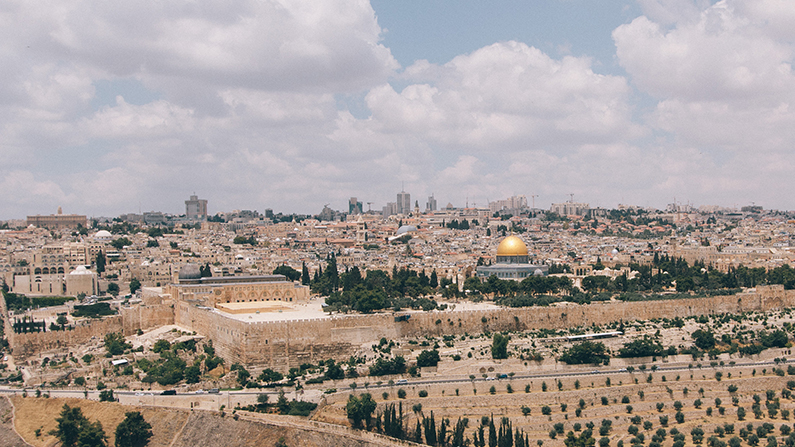
Situation Summary
On 23 November at around 07:00 to 07:30 local time, two explosions impacted the city of Jerusalem. Both explosions occurred at bus stops located in the Givat Shaul (stop ID: 647) and Ramot Junction (stop ID: 4009) entrances to the city. The geolocated site of the Givat Shaul explosion is situated less than 2km from the Knesset and Supreme Court, whilst the Ramot Junction explosion occurred close to the Ramot Alon Jewish settlement.
At least one person was killed and 17 people were injured during the first explosion at Givat Shaul, whilst the second explosion at the Ramot Junction injured a further five people and damaged a public bus located in the area. The Shaare Zedek Medical Center and Hadassah Mount Scopus Medical Center received injured persons from the twin explosions. The individual killed in the combined blasts has been identified as Aryeh Schopek, a 16-year-old Canadian citizen who lived in the Har Nof neighborhood of Jerusalem and attended a local yeshiva.
Initial reports indicate that two improvised explosive devices (IEDs) concealed in bags were responsible for the explosions. Both bags were left at bus stops during the busy hour of the early morning commute. Israeli police later confirmed that the explosions were being treated as a suspected combined terror attack conducted by a “Palestinian” individual or organisation. No independent verification of the claim of suspected Palestinian responsibility for the attack was immediately identifiable.
Police Commissioner Kobi Shabtai confirmed that an investigation into the attack was underway and did not rule out the possibility of multiple suspects. New anti- terror measures were also announced in the aftermath of the attack, including the deployment of police officers with sniffer dogs to all buses in Jerusalem to search for any as-of-yet undiscovered IEDs. Road closures have also been implemented, including a suspension of incoming traffic along Highway One which connects Jerusalem and Tel Aviv.
Outgoing Prime Minister Yair Lapid organised a national security meeting in Tel Aviv at 12:00 local time in response to the attack. Benjamin Netanyahu, the former and incoming prime minister, called for a “strengthening [of] the hands of the security forces” engaged in front-line anti-terror operations in the aftermath of the attack.
Solace Global Comment
Attacks on civilian infrastructure occur with some frequency in Israel, and buses have been targeted on multiple occasions over the past three decades. In 2022 alone, multiple terror attacks have occurred in Israeli territory, such as a mass shooting at a bus stop in Hadera in March, a mass stabbing and vehicle-ramming attack in Beersheba in March, a mass shooting in the Bnei Brak district of Tel Aviv in March, and a mass stabbing in El’ad in May. Palestinian and Islamist terror groups are often attributed with responsibility for many of these attacks, even when there is no official claim.
Though no group or organisation has claimed responsibility for the combined attack in Jerusalem, public attention has turned to Hamas. Mohammad Hamada, a Hamas spokesperson, issued a statement claiming that the “coming days will be intense and more difficult for the enemy” and that “the time has come for the creation of cells that are spread all over Palestine”. The discovery of an IED at the light rail tracks near the Jerusalem Central Bus Station during the evening hours of 22 November has raised concerns that the twin bomb blasts may have originally been intended as a triple, or even larger, attack. Further attacks remain likely in the short term.
At the time of writing, police reports indicate that the IEDs used by those responsible for the combined attack were packed with nails and likely remotely detonated. This method increases lethality despite the likely low-yield of the IEDs themselves, impacting civilians and surrounding infrastructure with metallic shrapnel. Security forces are certain to engage in an extensive investigation into the attack, and Israel Defence Forces (IDF) incursions into both Gaza and the West Bank are almost certain to occur in the short- term as Israeli authorities seek retribution for the terrorist incident. The explosions came as Netanyahu finalizes agreements with allies to form a new right- wing government that is set to include members of religious and far-right parties. Itamar Ben-Gvir, the head of the Otzma Yehudit political party and Netanyahu’s pick to be the next Minister of Public Security, visited the scene of the first attack and endorsed an aggressive response, calling for the government to “lay siege” to the culprits “even if it’s in the West Bank”. Ben-Gvir’s comments also endorsed house-to-house searches to locate those responsible for the attack with the intention of restoring the “deterrence power” of the Israeli government.
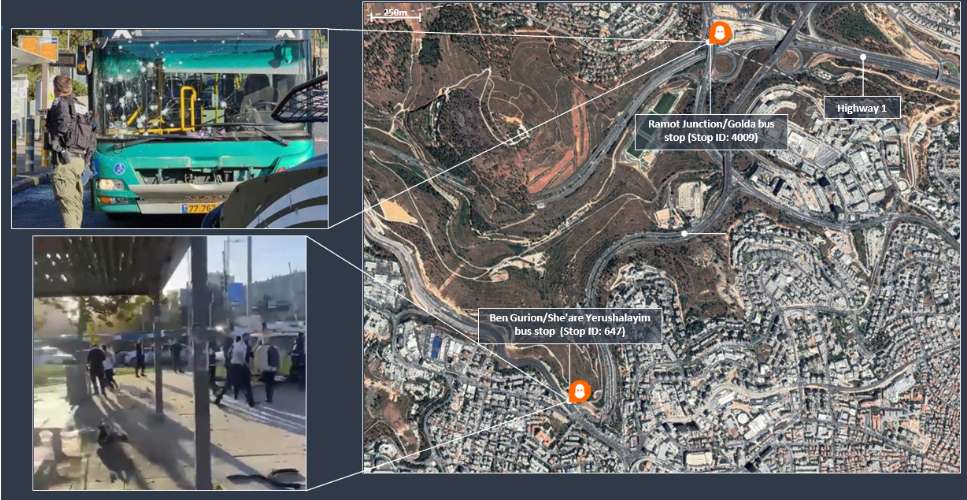
Solace Global Advice
- In the event of a terrorist attack those in the area are reminded to RUN – HIDE – TELL – FIGHT
- Israel has a high risk of terrorism. Further attacks remain likely in the short term, although the presence of additional security force personnel in Jerusalem will likely mitigate the risk of follow-on attacks in the immediate term
- Individuals with planned travel to Jerusalem are advised to reconfirm itineraries and expect localised travel disruption, particularly in the immediate vicinity of the incidents
- Travellers are advised to avoid the immediate vicinity of Givat Shaul and Ramot Junction as emergency services remain on the scene to conduct their investigations
- Further terror attacks in Jerusalem are likely to be indiscriminate, using explosives, bladed weapons, vehicles, and firearms to target crowded areas, government or security force installations and personnel, civilians, transportation networks, the Old City, and other high-profile locations including sites of religious significance
- Locations where large groups of residents or tourists are known to gather are at higher risk of attack. You should be particularly vigilant in these areas and follow any specific advice or guidance from the local authorities or security personnel
- Exercise increased caution, remain vigilant, be aware of your surroundings and report any suspicious activity or items to security personnel as soon as possible
- If caught in the vicinity of a security incident, seek immediate hard cover from any incoming gunfire or explosions and leave the area if safe to do so. Continue to adhere to all instructions issued by authorities and obey any security cordons in place
- Monitor the Solace Secure platform and trusted local media for updates
